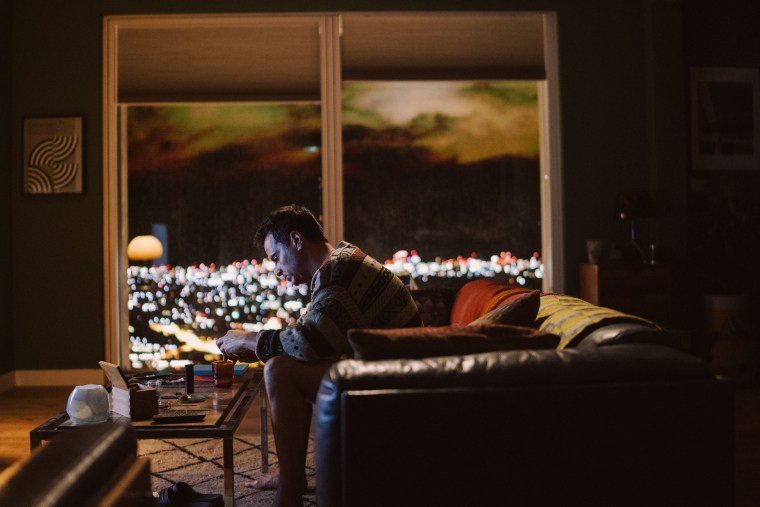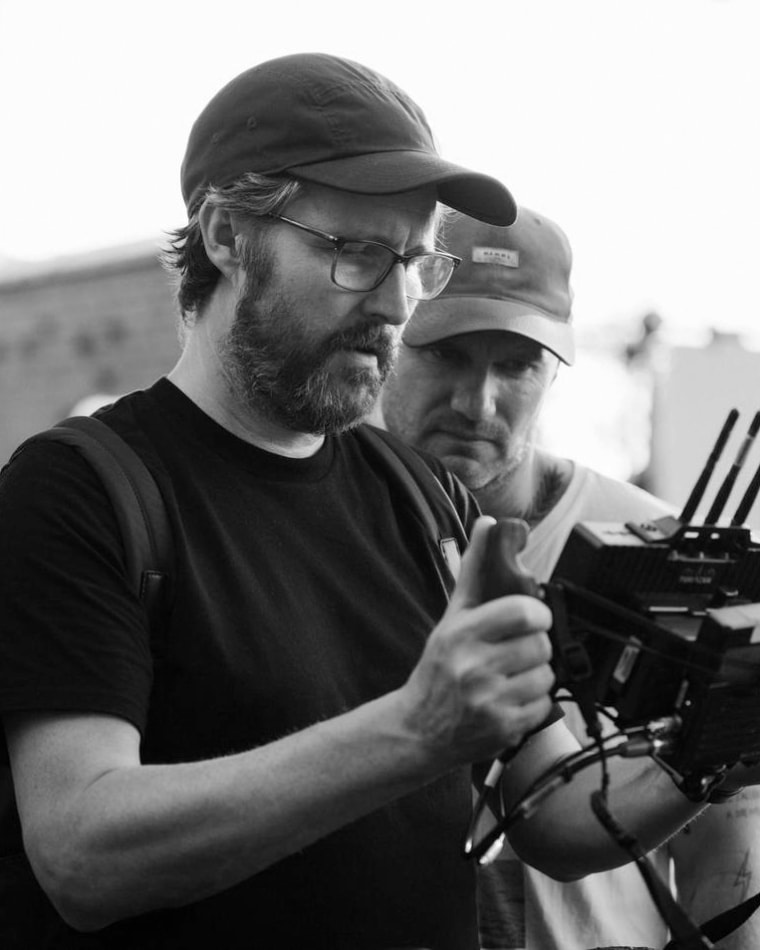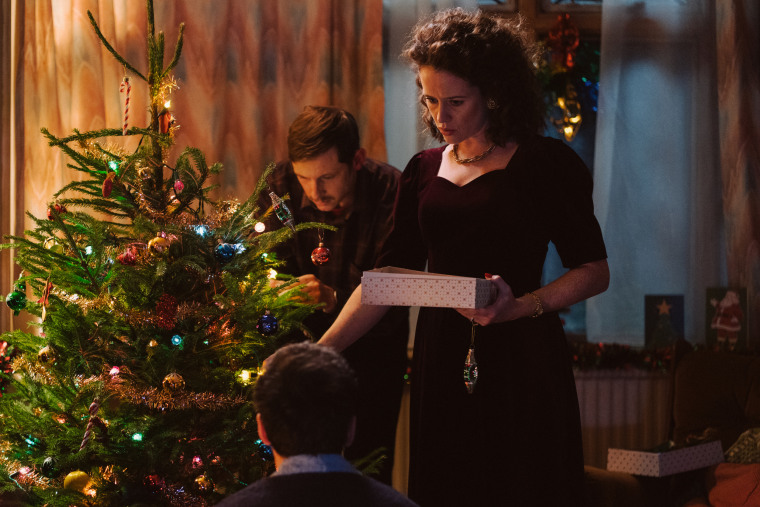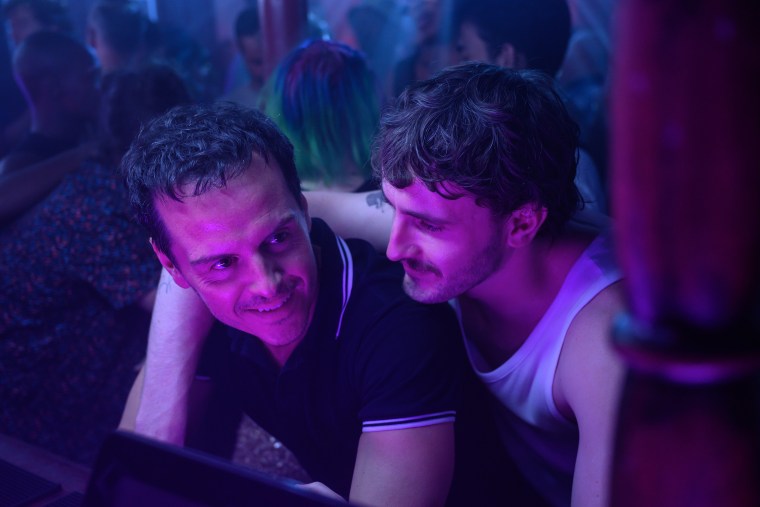British filmmaker Andrew Haigh is the patron saint of gay loneliness.
Or so I suggested to the acclaimed director-screenwriter, to his apparent amusement, in a recent interview about his devastating new tale of star-crossed male lovers, “All of Us Strangers.”
The film effectively returns Haigh to the scene of his first triumph, “Weekend” (2011). That little-film-that-could put Haigh on the map and secured a spot in the gay cinematic canon for its starkly visceral portrayal of the initially awkward and ultimately amorous connection between two lonesome Englishmen.
Like “Weekend,” “All of Us Strangers” is partly set in a high-rise flat — this one faces a distant London skyline — but departs from its predecessor’s firmly grounded realism in favor of hovering through a waking dreamscape.
Loosely adapted by Haigh from the 1987 Japanese novel “Strangers,” the film concerns the plight of Adam, an isolated writer in his mid-40s, played with tragic stillness by Andrew Scott. Emotionally frozen since his parents’ death three decades prior, Adam begins to thaw thanks to the gently romantic — and lustful — insistence of his neighbor, Harry. In the supporting role, Paul Mescal provides a delicate counterpoint to Scott in his portrayal of an adrift queer 20-something.
As the characters’ generation-bridging romance blooms, Adam episodically descends like Dante into a netherworld in which he visits his parents as they were before their untimely deaths. Mum and Dad, as they’re known, are played with emotionally guarded precision by Claire Foy (“The Crown”) and a mustachioed Jamie Bell (“Billy Elliott”). These alternating scenes of haunting magical realism afford poignant friction, and reconciliation, between late-1980s attitudes about homosexuality and AIDS and the present day’s more robust, if still ambivalent, appreciation of gay pride.
Scott’s take as the excitable “Hot Priest” in the final season of “Fleabag” teed him up for this exciting elevation to cinematic leading-man status, which has earned him a Golden Globe nomination. A fellow Irishman, Mescal boasts a talent for conveying raw pathos that made him a star through the limited series “Normal People” and garnered him an Oscar nomination for “Aftersun.” His smoldering good looks haven’t hurt him either.

Haigh, 50, calls “All of Us Strangers” his most personal film to date. The auteur said he was keen to convey the particular challenges faced by gay men like him who were born during the 1970s. Members of this “middle generation,” he noted, were largely spared the waves of AIDS-crisis deaths. And yet they had to come to grips with their sexuality under the shadow of that epidemic and during a corresponding period of virulent homophobia.
In Adam, Haigh sought to personify how these twin traumas could be as responsible for maintaining a gay man’s emotional paralysis as a car crash killing his parents at the dawn of his adolescence.
During his own coming of age, Haight said, he was left to wonder, “‘How on earth do I ever get to live? How do I ever get to have a relationship?’”

As Harry melts Adam’s defenses, he asks the older man whether he’d fancy having intercourse. Adam says he would — and then reveals that for a long time, he had avoided penetrative sex entirely, “for obvious reasons.” Belonging to the more sexually carefree younger gay generation that has only known HIV as a treatable infection, Harry naively asks why.
Adam replies that he thought that if he did, he might die.
Like the screenwriter Adam, Haigh has also trafficked in television. He was an executive producer and lead writer-director for HBO’s “Looking,” (2014-2016) during its two-season run, which culminated in a TV movie. The series divided audiences, with detractors expecting more zest than its deliberately low-stakes gay melodrama cared to offer. “White Lotus,” it was not.
The loss of loved ones stands at the center of all four of Haigh’s feature films. The protagonists in “Weekend,” the coming-of-age odyssey “Lean on Pete” (2017) and “All of Us Strangers” each lost both parents in childhood. And the chilly marriage at the center of “45 Years” (2015), a film that earned British film icon Charlotte Rampling an Oscar nomination, is pushed into a quiet crisis by revelations about the long-ago death of the husband’s previous lover.
Haigh’s own parents are, notably, still living. But they suffered a painful divorce when he was about 8 years old that coincided with his internal battles over his nascent sexuality. As an artist, he said, he keeps returning to the theme “of being completely unmoored and terrified at a certain time in your life.”
Orphanhood is a principal trope in his work, he said, because “as gay people we feel like we’re separated and forced away from our families,” even if those loved ones are demonstrably accepting.
In a director’s take on method acting, Haigh dove so deeply into his past that he arranged to shoot the “All of Us Strangers” homecoming scenes in the very suburban London house where his family lived prior to its own schism. And just as the stirred-up sediment of the past provokes headaches in Adam, the soft-spoken and sensitive Haigh endured a recurrence of the eczema he had weathered in childhood as his crew quite literally re-created his family home for the Mum-and-Dad scenes.
In one such scene, the film probes the source of Adam’s loneliness after he haltingly comes out to Mum. She is at first curtly disapproving, in a very British affectation of the homophobic mores of her time. “They say it’s a very lonely kind of life,” she says, attempting sympathy. Wincing, Adam counters: “They don’t actually say that anymore.” If gay people are lonely, he insists, it’s no longer because they’re pariahs; those days are long gone. “Everything’s different now.”

But Haigh’s own views on the source of gay loneliness suggest that Adam protested too much. Such pervasive disconnection is not, Haigh argued, rooted in simply being gay. Rather, it’s the product of the trauma of growing up in a homophobic society. (In academia, this is known as minority stress theory. Some academics further cite intraminority stress, or dysfunction within the gay community, as a contributing factor to mental health disparities in gay men.)
Haigh, who is married to the novelist Andy Morwood and has two children, confessed, “I still have a problem when I’m holding hands in the street.”
He added that even younger generations who came of age during less homophobic times and whose families are accepting of their sexuality still suffer the plight of Harry, who tells Adam that his innate difference from his family has cleaved his life from theirs.
“Anything that makes you ‘other’ makes you open to feeling different,” Haigh said. “And if you’re feeling different, you are open to feeling alone.”
While Haigh doesn’t subscribe to the increasingly popular position that only queer actors should play queer roles, he insisted it was nevertheless vital that he cast an openly gay man as Adam.
“There’s so much stuff that is in there about how someone experiences things growing up, that I just needed that person to be queer,” he said.
His first choice was Scott, 47, who came out publicly a decade ago and has long enjoyed success and acclaim across film, TV and theater in the United Kingdom.
Comparing what he characterized as the more diffuse sexual-identity boundaries in today’s youth culture with the rigid ones observed by his own generation, Haigh said of the 27-year-old Mescal, “I think if you asked Paul, the younger generation don’t necessarily define their sexuality in the way that some of us define our sexuality.”
What’s crucial for “All of Us Strangers” to succeed, Haigh said, is for Mescal and Scott to convince audiences of their on-screen chemistry, including during the film’s notable erotic turns.
“He’s a brilliant kisser, hands down,” an effusive Mescal recently told MTV of his co-star’s on-set snogging prowess.
“Their chemistry is real,” Haigh said, alluding to the men’s sexuality-bridging off-screen friendship. “They are so close to each other.”
“All of Us Strangers” goes into limited theatrical release Friday and then into wide release mid-January amid Oscar buzz. This raises hopes that unlike the much-hyped, glossy gay rom-com bomb “Bros,” the film won’t appeal merely to a niche audience.
Haigh insisted his new film’s concerns are universal: the longing, among parents and children, and all the lonely souls, to be loved and to love in return.
Crucial to cultivating love, Haigh said, is bridging the gulfs between us — “to be understood.”
“And if you are understood,” he said, “you feel less alone.”

